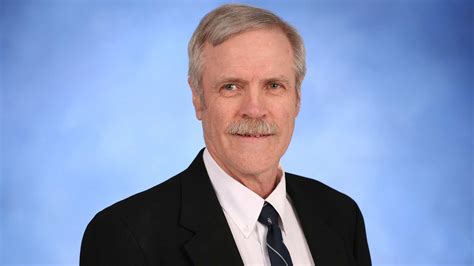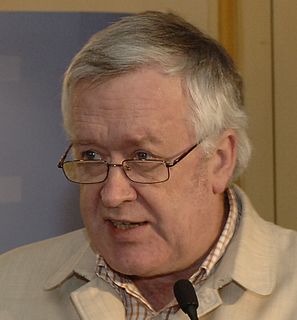A Quote by David Tennant
Back in 2005, when I was Christopher Eccleston, we saw one of the largest increases on record, of CO2 in the atmosphere. Unless we keep the rise in global temperature to under 2 degrees, by the time I'm Daniel Radcliffe or wee Jimmy Crankie, I won't be able to save the planet. I won't be here to help you -- well I might, but I'll be that bloke who won Any Dream Will Do.
Related Quotes
Each year we pump at least six billion tons of heat-trapping carbon into the innermost layer of our atmosphere, whose outer extent is only about twelve miles overhead. According to an IPCC (United Nations' Intergovernmental Panel on Climate Change) report released this year, atmospheric CO2 will, if the buildup is left unchecked, double from its pre-industrial level within the next century. That doubling of CO2 correlates with an increase in the global temperature of at least three to eight degrees Fahrenheit. The last ice age was just five to nine degrees colder than our current climate.
Diversity is a survival factor for the community itself. A community of a hundred million species can survive anything short of total global catastrophe. Within that hundred million will be thousands that could survive a global temperature drop of twenty degrees—which would be a lot more devastating than it sounds. Within that hundred million will be thousands that could survive a global temperature rise of twenty degrees. But a community of a hundred species or a thousand species has almost no survival value at all.
We'd already lost the possibility of stopping global warming entirely. That hasn't been in the cards for a long time. The triumph of Trump probably means that we're not going to be able to stop it at the two-degree mark that the world had been aiming for. That's very bad news, mostly because the planet seems to be more sensitive than we thought to even small increases in temperature.
We can no longer completely avoid anthropogenic climate change. At best, limiting the temperature rise to two degrees is just about possible, according to optimistic estimates. That's why we should spend more time talking about adjusting to the inevitable and not about reducing CO2 emissions. We have to take away people's fear of climate change.
CO2 cannot cause global warming. I'll tell you why. It doesn't mix well with the atmosphere, for one. For two, its specific gravity is 1 1/2 times that of the rest of the atmosphere. It heats and cools much quicker. Its radiative processes are much different. So it cannot - it literally cannot cause global warming.
It's likely that CO2 has some warming effect, but real proof of that hypothesis is tricky. You have to confirm by observation exactly how the CO2 changes the situation at different altitudes in the atmosphere and in different regions of the world. For example, CO2 is supposed to warm the upper air faster than the surface, but the measurements don't show that happening. When the CO2 effect is eventually pinned down, it will probably turn out to be weaker and much less worrisome than predicted by the global warming theorists.
... The reality is that atmospheric CO2 has a minimal impact on greenhouse gases and world temperature. Water vapor is responsible for 95 percent of the greenhouse effect. CO2 contributes just 3.6 percent, with human activity responsible for only 3.2 percent of that. That is why some studies claim CO2 levels are largely irrelevant to global warming.
We have no choice: we must protect Arctic ice, enable it to continue to act as an essential temperature regulator for the planet, avoid the catastrophic rise in sea levels that would result from the ice melt, and stop the disappearance of permafrost releasing irreversible quantities of greenhouse gases back into the atmosphere.
There's a lot of differing data [about global warming], but as far as I can gather, over the last hundred years the temperature on this planet has gone up 1.8 degrees. Am I the only one who finds that amazingly stable? I could go back to my hotel room tonight and futz with the thermostat for three to four hours. I could not detect that difference.


































